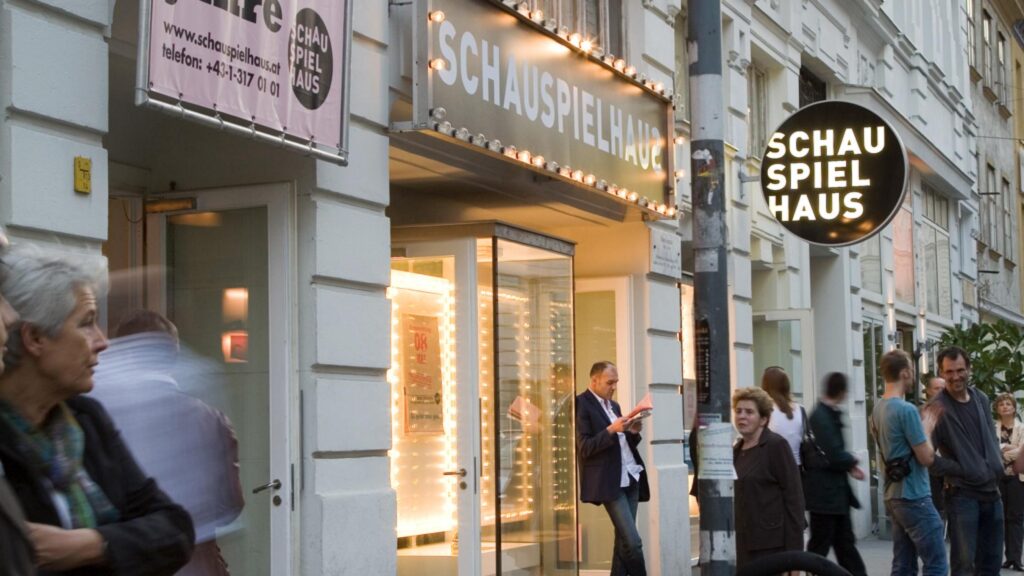Eve Leigh’s VERBRANNTES LAND in Vienna

An earlier play by Eve Leigh, Salty Irina, inspired director Tobias Herzberg so much at the Edinburgh Festival that he is now staging it at the Schauspielhaus Wien. As with other plays by Eve, Midnight Movie and Flächenbrand (Wildfire Road), I am translating this one into German. It tells the story of Eirini and Anna, who come up with the risky idea of taking the investigation into xenophobic murders in their neighbourhood into their own hands and approaching the right-wing scene in disguise.
For the German-language premiere in Vienna, I am delighted that the theatre generously invited me to take part in the first rehearsals. This phase is always a unique opportunity to check the text when the product of my desk work enters the actresses’ bodies and they chew it over, question it, savour it, modulate it, articulate it and fill it with their intentions. Then it becomes obvious how the modes of speech are helpful for the characterisations, whether the text could perhaps contrast one character more sharply with the other, whether my interpretation is too daring or whether I can take it further. Time and again, these first rehearsals, during which I am presented with the play read aloud for the first time in its entirety, inevitably also expose my own mannerisms, perhaps the overuse of some terms, incorrect as well as successful colloquialisms. Depending on the cast, the characters may unfold strongly, but in a different way than I have linguistically designed it.
In our preliminary discussions, we noticed the author’s attempt to accommodate a production in Germany and have the characters speak vaguely of ‘in the north’ or ‘in the south’. As Tobias rightly pointed out, this may work on the British Isles, but in Germany a phrase like ‘you people from the south’ doesn’t fit, whereas the north is more commonly referenced as region. Reference is also made to a coastal region and its dry humour. This, in turn, can be dropped in Austria, which lost its last access to the Mediterranean in 1918, or it means that the play is not set in Austria.
The play uses vocabulary from the discourse around migrant and feminist/lesbian issues. I am glad to discuss with colleagues and the production team the factually and technically correct terminology. Suggestions not to translate certain slogans also help me in the vast uncertain realm of the English language in the German.
We also come up against questions that we have to return to the author, as they concern decisions in the design of the characters or the text that would inappropriately interfere with her work. The passage that gives the film its title, for example, remains a subject of discussion between the publisher, translator, director and author for a long time. Fortunately, Eve is very happy to take part in detailed discussions and thus also has the opportunity to review and adapt her text in the new production situation.
And as Eve is also present for the first two rehearsals in Vienna, the whole team happily agrees: not only can we immediately ask numerous questions that we have brought with us and agree on solutions; our discussions also reveal things we did not recognize in our separate work situations. It turns out in the most gratifying way that the play is much more complex than we had realized when we had first read it. Every now and then we stumble across misunderstood references between the various levels and situations. The narrative situation and the undercover maneuver together with the exciting, but also often unspoken infatuation of the two young women creates a delicate web of ambiguity that the actresses have to unravel in order to be able to play it vividly later.
We arrived at a more subtle, finer picture of the situations that are often only hinted at in one word. For example, the residents of the squatted house become “suspicious” in response to a statement made by Anna. In German, I had read “Misstrauen” into this because she could perhaps be an informer into the left-wing scene in this politically illegal situation. But in fact they are only “vorsichtig” (cautious) because the young woman is perhaps going out too much on a limb with her ‘dramatic’ nature. The author gives us a lot of material about the characters’ backstories in a country that she perceives as extremely class-conscious and exclusive between the classes. And that must also become true for the German version. How are language codes used here to distinguish and exclude people? The author, in turn, realizes that she can make the physical danger that the women are in even more present and noticable with a few half-sentences and thus create another arc to the end of the play. And from the actresses’ questions, she realizes that a little explanation can actually support a certain moment in the text. She was also able to change the ending to give the production the right final note in German as well. So we also see her at work.
After consultation with the playwright, some changes will be incorporated into a publisher’s version (represented by Rowohlt Theater) for further productions. Other changes will only be seen in Vienna, while I will retain my decision in the agency’s version. This process is always so exciting because every decision can be thoroughly scrutinised again. This is only possible together, in dialogue. If the text is to be as successful as possible, it is advisable to consider the translator as part of the team and to use this expertise as a resource. I, too, am in a position to defend my decisions in favour of a coherent text, situational language and strong characters often enough against suggestions which would otherwise end up in the production unchecked and water down the text.
Verbranntes Land
by Eve Leigh
translated from English by Henning Bochert
German-language Premiere
15.03.25 | Schauspielhaus Wien
Some Press
- Nachtkritik (Andrea Heinz)
- Der Standard (Michael Wurmitzer)
- Salzburger Nachrichten (Sonja Harter/APA)
- Der Kurier (Susanne Zobl; pay)



Leave a Reply